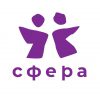Situation in Ukraine
War and everything is different. The world as we knew it does not longer exist. The cooperation with our friends in Ukraine has already changed. Today we collect donations for LGBTIQ* on the run, we provide emergency aid for queer people in need, we support LGBTIQ* organisations that operate shelters for queer people who need a place to sleep, food and medication. YOU CAN HELP HERE
Cities are under attack, millions are fleeing, there is a lack of everything. In addition, there are rumours of so called detaining lists that include LGBTIQ* activists. Not everyone can leave the country: Men* and male-read trans* people are not allowed to leave the country because of the general mobilisation. And aren’t queer minorities already vulnerable groups, often traumatised by years of discrimination? Especially in Ukraine.
The success story
We were, actually, on the right track: the LGBTIQ* community in Ukraine was more visible than ever before the invasion of the Russian army.
However, hatred and violence have always been affecting lesbians, gays, bi, trans*, inter* and queers (LGBTIQ*) while the political class remained inactive. The government publicly protected community events such as KyivPride, but otherwise did little for the civil and human rights of those affected. And this despite the fact that nationalists were mobilising against sexual minorities more than ever.
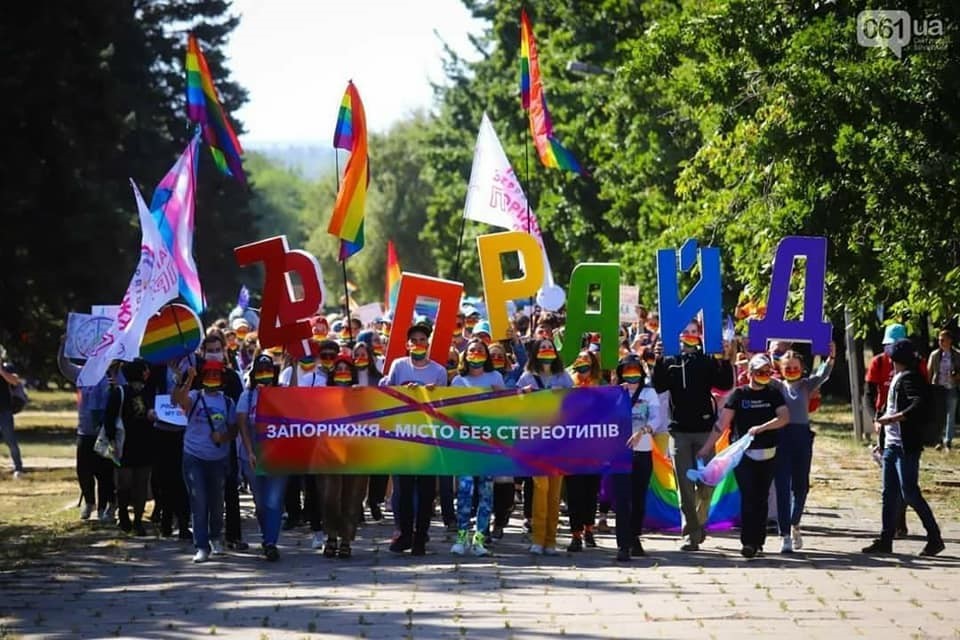
The reports published by the Kyiv based Human Rights organisation Nash Svit regularly unveil in all details the real situation of lesbians, gays, bi, trans*, inter* and queers in Ukraine: How justice, politics, media, churches and society position themselves, where discrimination and violence have occurred, and of course it reports on the lives of sexual minorities in the occupied territories. The result is quickly summarised: Ukraine’s reform course has stalled in this area and violent ultra-right splinter groups are setting the agenda.
Indeed, organisations such as National Corpus, Pravyj Sector, Tradition and Order, Trysub (Trident), Karpatska Sitch, Sokil (Falcon), Bratstvo (Brotherhood) etc. were attacking public events before the war and institutions of the LGBTIQ* community more and more often. The presence of local and national media made such actions attractive for the attackers, as they could better spread their messages to protect “the traditional Ukrainian family” against Western decadence. While right-wing parties are not currently represented in Ukraine’s parliament, the Verkhovna Rada, and have little influence on politics and society, they have nevertheless been very present on the streets. Homo- and trans*-phobia has recently become their favourite topic.
Attacks on the street
Around 17 May, there were always incidents directed against events on the International Day Against Homo-, Bi-, Trans*- and Inter*-phobia (IDAHoBIT). All over Ukraine – apart from the Corona years – smaller events such as flash mobs, protests, rallies and discussions traditionally take place. In Zaporizhzhya, during a meeting of the local LGBTIQ* organisation “Gender Zed” three years ago, a firecracker was thrown into the crowd of protesters; a police officer was injured. The courts have since convicted the man.
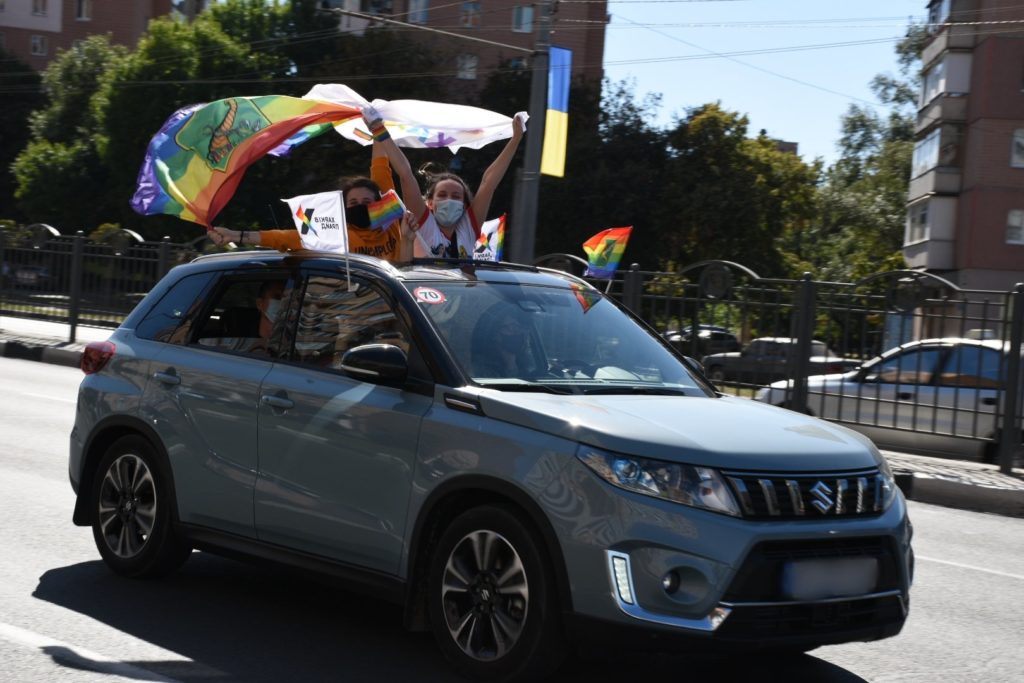
In Chernivtsi, right-wing radicals and believers blocked the Equality Festival three years ago, to which the LGBTIQ* organisation Insight from Kyiv regularly invited people all over Ukraine. At the end of the same year, 2019, it was the Coming Out Festival held by the NGO Sphere in Kharkiv. The event was cancelled for security reasons, the police evacuated the participants but let the radicals go ahead.
In Kharkiv as in Kryvyi Rih, too, nationalists regularly attacked the city’s LGBTIQ* community centres, be it the PrideHub run by the NGO Sphere or the Queer Home of which the NGO Gay Alliance Ukraine is in charge. The head of the organisation was severely beaten up. He prefers not to have his name mentioned publicly. “They shouted ‘Sieg Heil’ and ‘Death to the pederasts'”, he says. The police did not catch the perpetrators.
Praying for Godly Order
And even in the pandemic year of 2020, the hateful opponents of a liberal social order did not back down from their agenda. Wherever they could, they were present. At OdesaPride, which took place in August, they brutally roughed up the crowd of demonstrators; the police just watched everything passively for a long time. The Prides 2021, however – a turning point? – took place peacefully in Odesa and throughout the country.
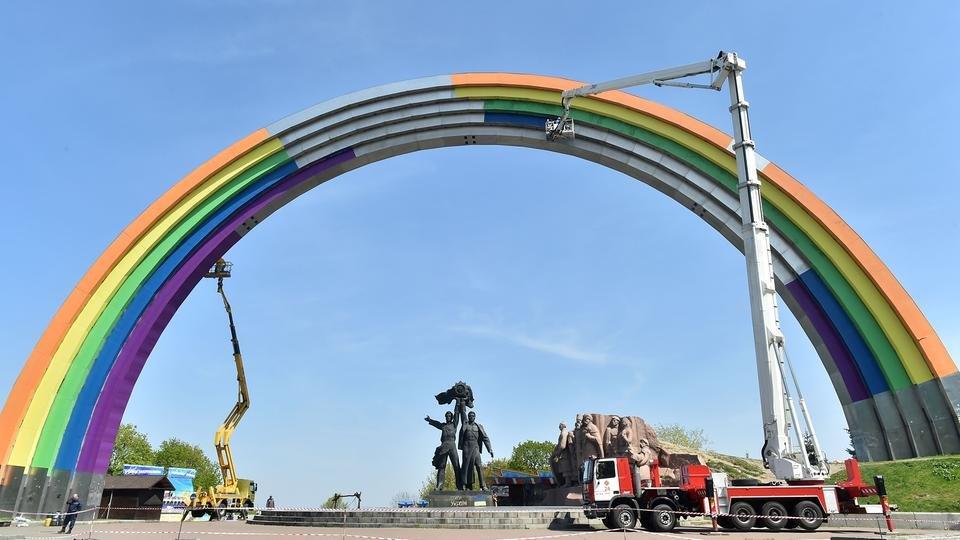
The nationalists often received support from religious fundamentalists such as the organisation “Love against Homosexualism”. The fundamentalists persistently wrote homophobic petitions. In terms of content, they were in line with the country’s churches, which now prefer to remain silent when it comes to LGBTIQ* issues. Only Patriarch Filaret, a prominent representative of the Ukrainian Orthodox Church, publicly blamed same-sex marriages for the corona virus. He then contracted it himself.
Most of the submissions were, in the past, directed against the promotion of “non-traditional families”, i.e. against so-called gay propaganda, supposedly in order to protect minors, and in this respect are reminiscent of the legal situation in Russia. In Russia, said to promote homo- and transphobia in Ukraine by the way, the law banning “propaganda of non-traditional sexual relations” has led to a hunt against homosexuals since 2013 and has resulted in numerous human rights violations to this day.
Violence against minorities
Cities such as Poltava, Ternopil and Ivano-Frankivsk regularly sent complaints to the political leadership in the capital, demanding that “gay propaganda” be stopped and discrimination against sexual minorities be written into the law.
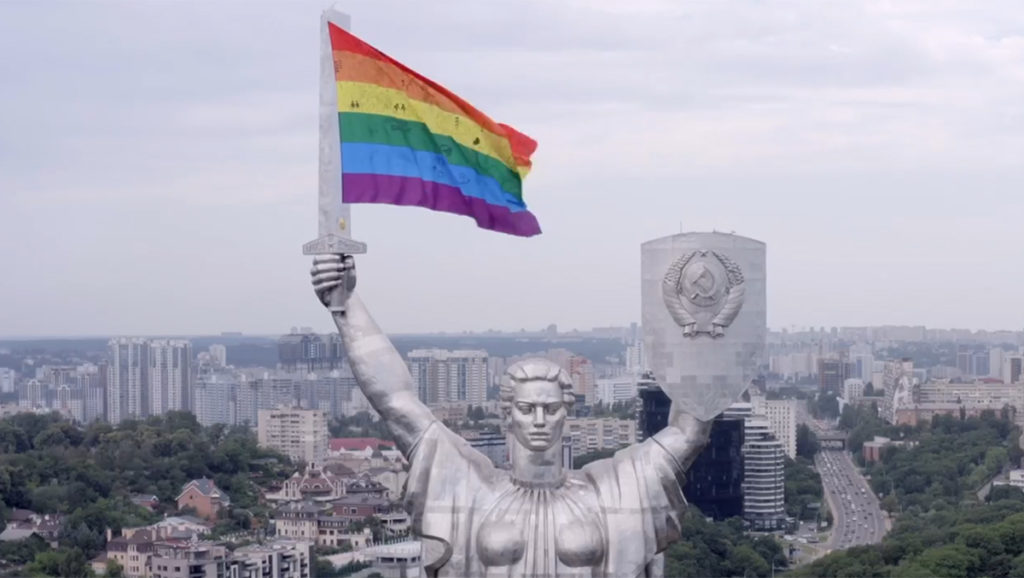
The homo- and trans*-phobia that was fomented in this way repeatedly led to discrimination and violence. Lesbians, gays, bisexuals, transgender and intersex people probably experience verbal and physical assaults almost daily, assuming that not all of them actually report what they have experienced. The fear of coming out to the police and the shame of being a victim play a major role here. According to Nash Svits’s reports, LGBTIQ* are ridiculed and publicly discredited – at school, at work, while shopping.
While the police in Ukraine officially record hate crimes based on homophobia and trans* phobia, they do so only rarely and usually reluctantly, making it difficult to prosecute such acts. In the eyes of the law, so-called hate crimes are still not considered “particularly serious”, which normally should lead to harsher penalties if convicted. In many cases, the police discriminate against the victims themselves or do not show much interest in successful investigations – although the situation has already improved to some extent through the state-mandated training of many police officers in human rights issues. In the past few years, round tables have repeatedly taken place, in which employees of the Ministry of the Interior and the police have participated alongside human rights activists and LGBTIQ* organisations. The goal: combating hate crime, helping to make public LGBTIQ* events safe and ensuring that sexual minorities are treated respectfully.
Soft opening
In the eyes of Ukrainian civil society, politics – with exceptions, especially at the local level – were not taking a decisive stand against the nationalists in the country. In the eyes of LGBTIQ* activists, the government did not even stick to its own plans. More on this later.
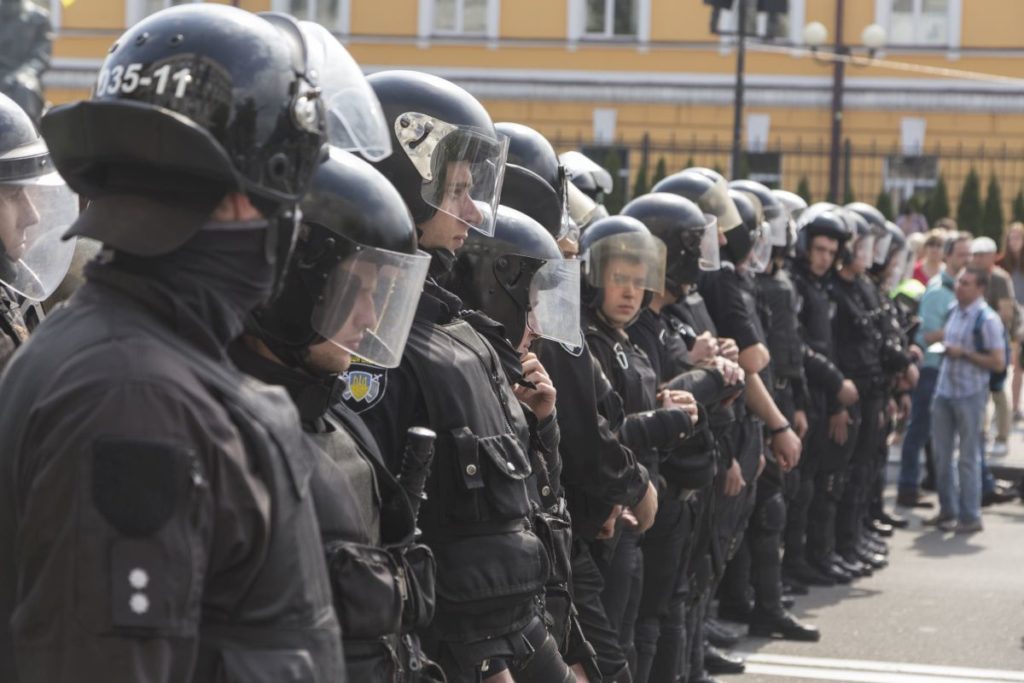
The situation for lesbians, gays, bisexuals, transgender and intersex people in Ukraine was all the more unsatisfactory because the situation had actually improved on a legal level in recent years. Acceptance in parts of the population had also increased.
This is suggested by the study “What Ukrainians Know and Think About Human Rights: Assessing Change (2016-2020)”, which was carried out by the Ilko Kucheriv Democratic Initiatives Foundation before the war. Compared to 2016, the proportion of citizens who considered tolerance a fundamental value had increased by 6 percentage points to 31%. In general, more and more people understood that sexual minorities suffer particularly from discrimination (26.3 percent).
Successful Pride movement
“In fact, LGBTIQ* issues no longer arouse particularly strong feelings among the Ukrainian population,” says Andriy Kravchuk, one of the managers of Nash Svit. People were quite willing to talk when it came to sexual minorities. The country was opening up.
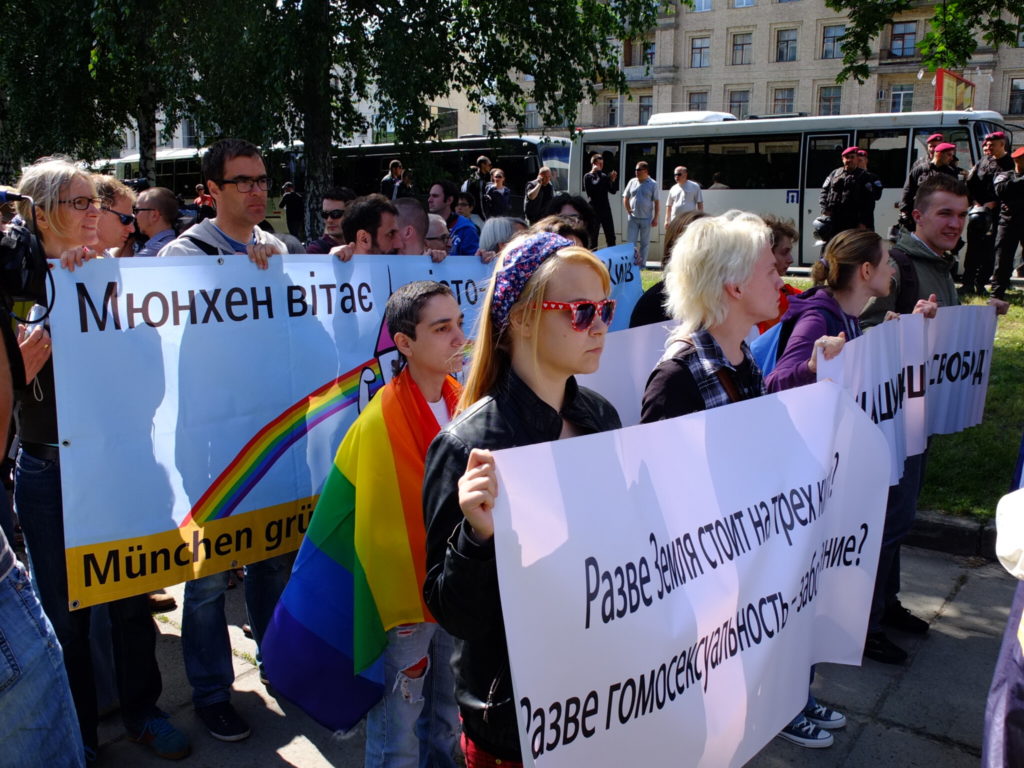
Together with awareness campaigns, the Pride movement has probably been responsible for this development. Since 2012, activists from Kyiv, then the Gay Alliance Ukraine and finally the organisation KyivPride together with Amnesty International had tried to hold a Pride every year. At the Pride, lesbians, gays, bi, trans* and inter* – demonstrate every year for equal rights – in memory of the 1969 Stonewall Uprising in New York. It is a mixture of party and politics. In Ukraine, however, political motives are in the foreground.
Supportive society
In 2013, still under President Viktor Yanukovych, a Pride was able to take place in Kyiv for the first time. 150 people demonstrated outside the city under police protection which was provided thanks to the strong participation of foreigners. In 2021, more than 7,000 people (!) marched in the centre of the city in front of the Taras Shevchenko University, and by no means only representatives of the LGBTIQ* community. The guests from abroad made up only a fraction of the participants. Of course, still thousands of police officers protected the big event, because the radicals do not miss the occasion to show up. The organizers fear blockades and violence every time, but since 2019 it has remained a peaceful protest.
KyivPride has always been controversial: a majority of Kyivians (57 per cent) opposed it, according to a survey conducted by the market research institute Active Group in April 2017; 38 per cent were in favour. A few years ago, however, the number of supporters would certainly have been much lower.
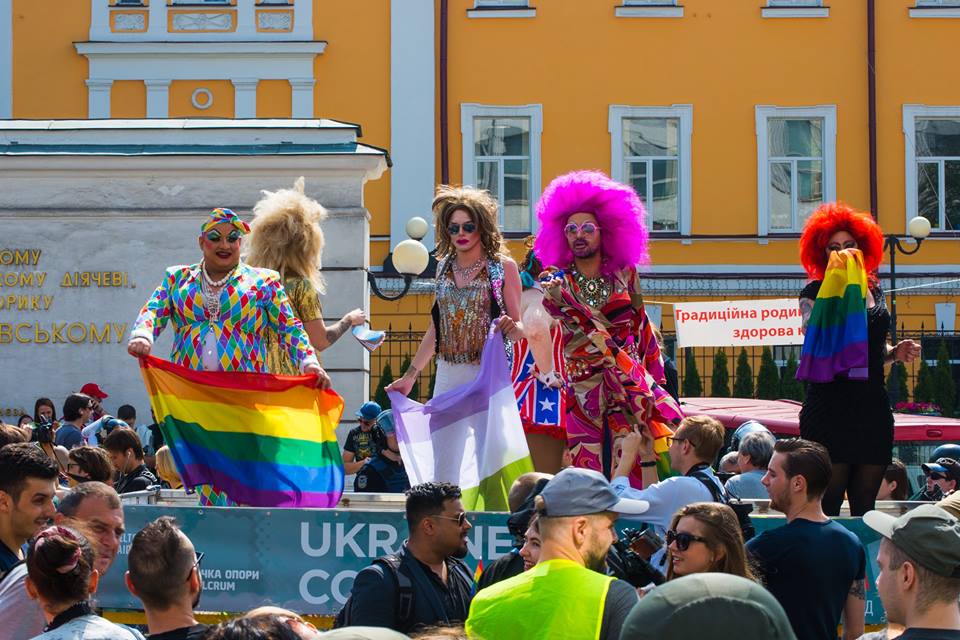
In addition to KyivPride, other LGBTIQ* organisations had started to hold events of their own: the NGO Gay Alliance Ukraine offered one in Odesa and Kryvvyi Rih, the NGO Gender Zed did so in Zaporizhzhya and Sphere in Kharkiv.
Many people today support the opening of their country to sexual minorities – especially parents of lesbians, gays and transgender people as well as their friends, but also influential musicians like Iryna Bilyk and Jamala (winner of the Eurovision Song Contest in 2016), artists, bloggers and members of the Parliament. Companies such as the women’s fashion label “Who is it?” and Privat Bank also support the community. In general, Ukraine’s LGBTIQ* community is now well in touch with many areas of politics, society and business.
Human Rights Politics: all well on the outside, no good on the inside
Politicians had an interest in protecting these major events because foreign countries were watching. Ukraine cannot afford to alienate the EU as a partner, too much depends on it economically and politically, especially now. And ultimately, the government’s officially LGBTIQ*-friendly course is also a means of distancing itself from Russia. In the embattled Donbass, the issue is not regulated at all; in Crimea, Russian laws against “gay propaganda” apply. Basically, however, most politicians were indifferent to the issue.

Perhaps this is why the government and parliament have always shown little motivation to implement their own action plan for human rights, which they themselves had launched on 23rd of November 2015. It envisaged comprehensive legislative projects until 2020, including
- protection against discrimination based on sexual orientation / gender identity,
- a registered partnership for same-sex couples,
- new medical standards for transgender people,
- the enshrinement (in the penal code) of hate motives as aggravating circumstances, and
- an abolition of the adoption ban for transgender and HIV-positive people.
The deadlines for the bills had passed several times. At least the new government under President Volodymyr Zelensky relaunched the action plan, extended it until 2023 and retained its contents.
The future lies in the West
So politicians were waiting on the sidelines while nationalists (and religious people) grew increasingly active and posed a real danger to sexual minorities. Nationalists were much better organised than before, managed to mobilise their – mostly young – supporters quickly and attacked when they found an occasion to do so. No public LGBTIQ* event was safe from them.
Unsurprisingly, nationalists were also no fans of feminist events and generally of events on topics such as gender justice and equality. Attacks had recently increased at an alarming rate. They even affected events where the police was involved, such as the aforementioned round tables.
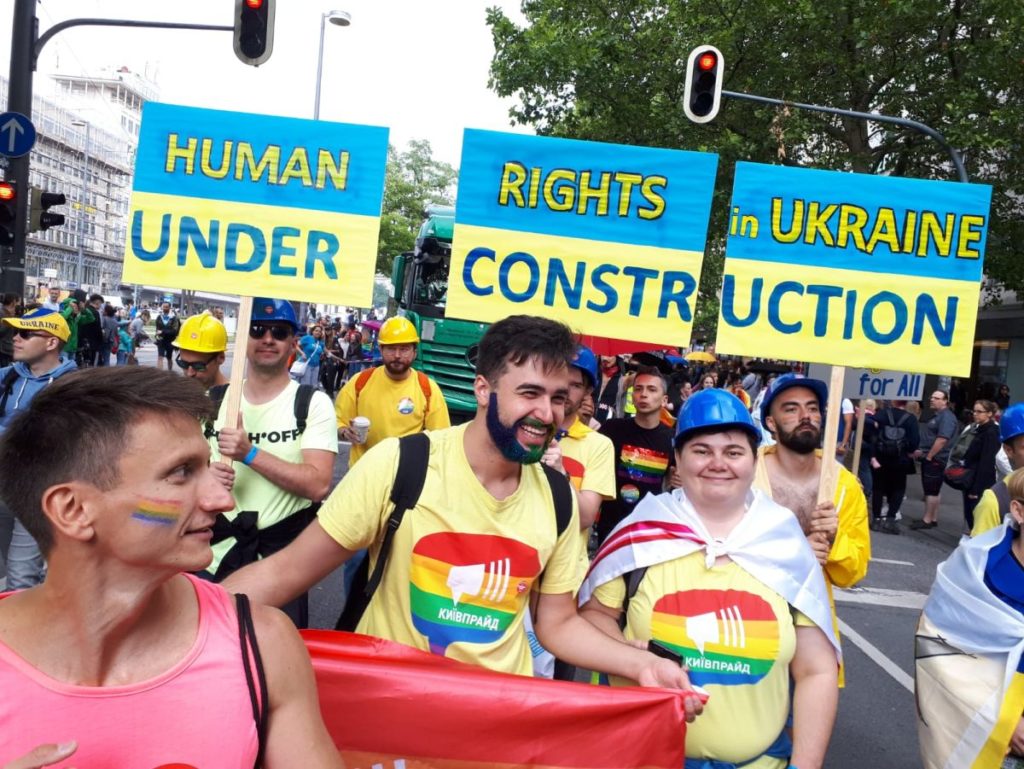
The public has never really taken the issue seriously, especially since large parts of the political class did not seem to see a big problem in it. Are the nationalists opponents? Allies? Are they trying to destabilise Ukraine?
European diplomats suspect that Russia has partly been responsible for these activities – by hiring its own people. However, they do not want to be quoted openly. In any case, human rights activists would have liked to see Ukrainian politicians distance themselves more clearly from right-wing activities.
In the long term, however, most LGBTIQ* activists believe that Ukraine’s opening to the West will change the situation of the community and society as a whole for the better. The Russian government, with its homophobic agenda, represents an outdated model that Ukraine cannot emulate, especially now. The LGBTIQ* community has made a decisive contribution to positive change in Ukrainian society with its fight for human rights. Is all that now in question again?
Hope for acceptance and equal rights
Possibly. On the other hand, LGBTIQ* serve in the Ukrainian army, some are openly wearing the unicorn emblem on their sleeves. Many help out in the territorial defense, in helping organisations, support the country from abroad in various ways. The community hopes that the visibility and solidarity of queer people in the fight for their own country will further increase acceptance in society.
In the middle of the war, a draft law was brought to parliament for civil partnerships in order to strengthen the rights of LGBTIQ*. Because – for example – if someone in a same-sex relationship is killed in combat, the partner cannot collect or bury the body. Ukrainian law forbids it. As a reaction to this, president Volodymyr Zelensky has promised to consider “registered civil partnerships”.
It is a part of the above-mentioned Human Rights Action Plan, which has become part of Ukraine’s Recovery Plan. Even before that, the Ukrainian Parliament had ratified the Istanbul Convention and passed a comprehensive anti-discriminiation law. Churches and right-wing forces had vehemently opposed it for years. But they are currently losing popularity and influence with their anti-modern course.
Opponents lose support
So, the chances for more equality are actually not that bad. According to a recent study by the above-mentioned LGBTIQ* Human Rights Centre Nash Svit, almost 34 percent of the population in Ukraine still have reservations about LGBTIQ*. Two years ago, this figure was over 38 percent. And 28 percent of all Ukrainians explicitly support civil partnerships. A year earlier, only 24 percent were in favour. In 2016, to look at a longer period, it was just 5 percent! Other surveys confirm these trends. Ukraine is changing fast now.

































